 Neuerscheinungen 2016Stand: 2020-02-01 |
Schnellsuche
ISBN/Stichwort/Autor
|
Herderstraße 10
10625 Berlin
Tel.: 030 315 714 16
Fax 030 315 714 14
info@buchspektrum.de |

Marilyn Fleer, Niklas Pramling
(Beteiligte)
A Cultural-Historical Study of Children Learning Science
Foregrounding Affective Imagination in Play-based Settings
Softcover reprint of the original 1st ed. 2015. 2016. xix, 213 S. 2 SW-Abb., 11 Farbabb. 235 mm
Verlag/Jahr: SPRINGER NETHERLANDS; SPRINGER 2016
ISBN: 9402405763 (9402405763)
Neue ISBN: 978-9402405767 (9789402405767)
Preis und Lieferzeit: Bitte klicken
This book moves beyond the traditional constructivist and social-constructivist view of learning and development in science. It draws upon cultural-historical theory in order to theorise early childhood science education in relation to our currently globalised education contexts. The book argues that concept development in science for young children can be better theorised by using Vygotsky´s concept of Imagination and creativity, Vygotsky´s theory of play, and his work on higher mental functions, particularly the concept of inter and intrapsychological functioning. Key concepts are extracted from the theoretical section of the book and used as categories for analysis in presenting evidence and new ideas in the second section of the book. In this second part of the book, the authors examine how science knowledge has been constructed within particular countries around the globe, where empirical research in early childhood science education has occurred. The third part of the book examines the nature of the encounter between the teacher and the child during science learning and teaching. In the final part of the book the authors look closely at the range of models and approaches to the teaching of early childhood science that have been made available to early childhood teachers to guide their planning and teaching. They conclude the book with a theoretical discussion of the cultural-historical foundation for early childhood science education, followed by a model of teaching scientific concepts to young children in play-based settings, including homes and community contexts.
Section 1: Theoretical foundations for learning science in early childhood.- Learning science in everyday life - a cultural-historical framework.- How preschools environments afford science learning.- Imagination and its contributions to learning in science.- Theoretical and conceptual insights - the young learner in science.- Section 2: Knowledge construction in science.- Knowledge construction in early childhood science: The human invention of empirical, narrative and theoretical.- Knowledge construction is culturally situated.- Positioning children in research and the implications for our images of their competence.- Section 3: The pedagogical construction of learning science.- Learning and metaphor: Bridging the gap between the familiar and the unfamiliar .- Simile, metaphor and learning to perceive the world in functional and culturally relevant ways.- Learning to ´read´ and produce graphical representations.- The nature of educational encounters.- Theoretical and conceptual insights - representations in science.- Section 4: Models of early childhood teaching.- A cultural-historical model of early childhood science education.


